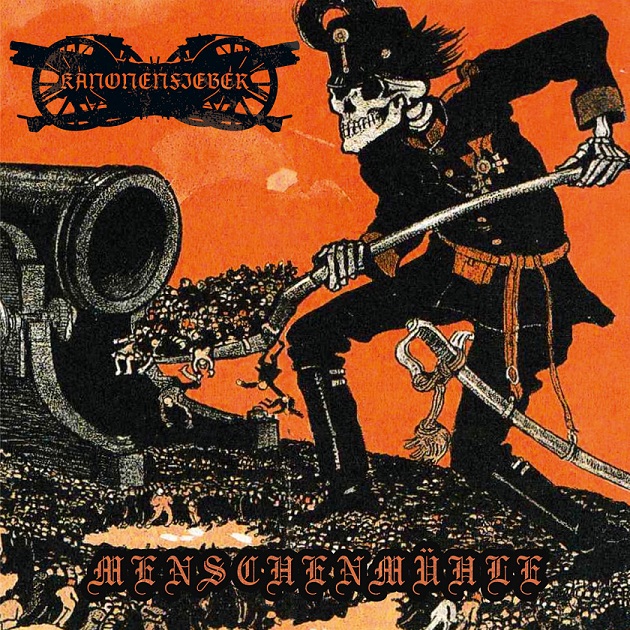Surprisingly good WWI blackened death - 80%
Written based on this version: 2021, Digital, Noisebringer Records
As the first album by the blackened death metal project of artist Noise, Kanonenfieber's Menschenmühle is simply put not something I considered possible today in the spectrum of metal music. The album deals with subject matter that is absolutely done to death throughout metal's history, yet the lyrics are fresh and exciting. The album is theatrical and tonally very well-developed and clearly blackened in its musical style, but the death metal vocals and very clear production quality makes the vocals understandable and inviting to sing along with. And because the artist is German himself, the album has an 'authenticity' and quality that just can't be reproduced by e.g. Minenwerfer. For all these reasons and more I will get into shortly, this is an album that I definitely rank highly among the recent wave of world war themed black and death metal.
Some housekeeping: It really helps if you're fluent in German, both to listen to the vocals of the album and to understand the various interviews Noise did around the launch date of the album. I will be plucking some random bits of information from these interviews for this review.
So, to start with the lyrical themes; Menschenmühle genuinely tries something new here; like Von Thronstahl and other - let's euphemistically call it extreme views-propagating music - it incorporates sampled speeches of prominent figures in wartime. But Kanonenfieber doesn't do this to convey adoration or ideological identification - the lyrical tone is much more like a documentary. But this in turn clashes and at the same time synergizes really well with the low/mid grunting style vocals, which at first glance really shouldn't fit a documentary. Likewise, the vocals and music (and in some instances like halfway through Die Schlacht Bei Tannenberg: the samples) do their best to establish the mood and intensity of the subject matter, but nonetheless mostly stay descriptive. If this were pure black metal, I'd expect a much more emotional delivery - if this were pure war death metal, I'd expect a much more glorious delivery.
Vocally, the artist brings a very consistent albeit simple performance to this album. Noise's voice character is quite common and the range on display on the album is limited to mid and low clear grunts. Vocals are doubled or tripled up in editing to add some extra body, but this isn't done particularly subtly. That being said, while the vocal performance isn't exceptional, it's not at all distracting or anything; it's fine.
The instrumentation though - and the transitions! Oh gods, there is some talent and creativity going on in this album. Already at the end of the build-up to the first track 'Die Feuertaufe', there are some synchronized blast beats/double kicks and guitars that would drive a concert crowd wild if it'd be played that cleanly live. Then just before the first verse, the music slows down, then goes into double time, then quads into blast beats. Together with the simple but catchy tune being played on the single lead guitar (most of the melodic parts of the music are played in single voice, i.e. very simple to follow but no less satisfying), this is just heaven for any death metal fan. On 'Die Schlacht bei Tannenberg', there is another satisfyingly creative transition going from the introduction to the first verse - again double-timing into blast beats, but also into an unaligned double time signature. It's not complicated at all to listen to, rather it's a piece of flair that elevates the music just that bit more.
Which brings me to the pacing of the album. Like many death metal albums, it's quite front-loaded, with the majority of the really heavy and complicated stuff at the start (basically the first three tracks), and a lot of lower-tempo, not as much percussion driven stuff at the end. I think this is where the limited vocal range most clearly becomes a hindrance; I'd much rather have heard some clean vocals over Unterstandsangst's introductory verse. Likewise, it's clear that 'Grabenlieder' and 'Grabenkampf' form a contrasting pair of tracks, but they're one after another on the album - both thematically and pacing-wise I'd put it in place of Dicke Bertha, also creating a little bit of downtime between two absolute banging tracks on the album, making them pop even more.
And to round out my critique, we have to talk about the production. I can't believe I'm writing this, but it's quite barebones. Of course, modern desktop editing software and affordable studio time means the instrumentation is pitch perfect and perfectly aligned, and of course the vocals are extremely clear which is a clear standout of this album. Mixing levels are good. It's objectively a well-produced album, but....
... well, it's simple. It lacks depth in production that makes me come back to artists like Igorrr and Der Blutharsch (sorry again for the many non-metal namedrops). Vocal tracks are doubled up, but this is done pretty bluntly with hard cuts. Instrument tracks *seem* (I haven't actually analyzed this) copied here and there. The raw editing on early metal albums used to be praised - it gave some tracks a lot of extra character for their unrefined audio quality. But with audio so crisp, there's no character being added with, dare I say, lazy editing? That feels blasphemous to say.
But I think it is true praise if all I can fault the album for is its technical quality. This, ultimately, barely matters. The music is catchy and the lyrics are fresh. There's some real creativity and talent on display. I cannot help but become very happy listening to this music. Menschenmühle is a little Meisterwerk - a masterpiece in the original sense of the word. A showcase of the artist's best qualities, but with some rough edges.

